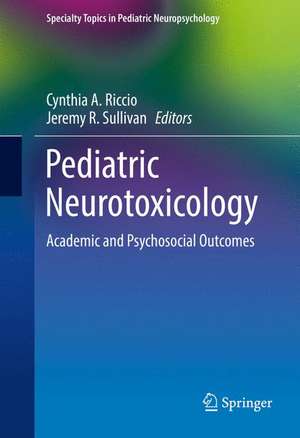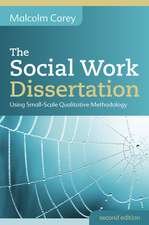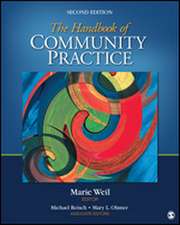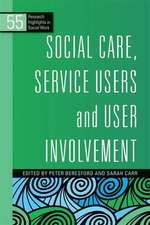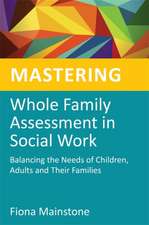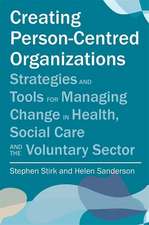Pediatric Neurotoxicology: Academic and Psychosocial Outcomes: Specialty Topics in Pediatric Neuropsychology
Editat de Cynthia A. Riccio, Jeremy R. Sullivanen Limba Engleză Hardback – 18 aug 2016
| Toate formatele și edițiile | Preț | Express |
|---|---|---|
| Paperback (1) | 449.74 lei 6-8 săpt. | |
| Springer International Publishing – 11 iun 2018 | 449.74 lei 6-8 săpt. | |
| Hardback (1) | 529.60 lei 6-8 săpt. | |
| Springer International Publishing – 18 aug 2016 | 529.60 lei 6-8 săpt. |
Preț: 529.60 lei
Preț vechi: 623.06 lei
-15% Nou
Puncte Express: 794
Preț estimativ în valută:
101.34€ • 110.42$ • 85.39£
101.34€ • 110.42$ • 85.39£
Carte tipărită la comandă
Livrare economică 23 aprilie-07 mai
Preluare comenzi: 021 569.72.76
Specificații
ISBN-13: 9783319323565
ISBN-10: 3319323563
Pagini: 218
Ilustrații: XIV, 198 p. 1 illus.
Dimensiuni: 155 x 235 x 13 mm
Greutate: 0.48 kg
Ediția:1st ed. 2016
Editura: Springer International Publishing
Colecția Springer
Seria Specialty Topics in Pediatric Neuropsychology
Locul publicării:Cham, Switzerland
ISBN-10: 3319323563
Pagini: 218
Ilustrații: XIV, 198 p. 1 illus.
Dimensiuni: 155 x 235 x 13 mm
Greutate: 0.48 kg
Ediția:1st ed. 2016
Editura: Springer International Publishing
Colecția Springer
Seria Specialty Topics in Pediatric Neuropsychology
Locul publicării:Cham, Switzerland
Cuprins
Introduction. - Fetal alcohol effects.- In utero exposure to nicotine.- In utero exposure to cocaine and amphetamines.- In utero exposure to opiates and marijuana.- In utero exposure to anti-epileptic drugs.- In utero exposure to psychiatric medications.- Direct exposure to pesticides.- Direct exposure to metals, especially lead.- Direct exposure to environmental pollutants.- Conclusion.
Recenzii
“Pediatric Neurotoxicology: Academic and Psychosocial Outcomes, a small but packed volume on the short- and long-term effects of pediatric neurotoxicity. Published as part of a series entitled Specialty Topics in Pediatric Neuropsychology, this small book should be included as a basic reference for beginning students in human genetics or neurodevelopment, pediatric clinicians, teachers, and human service providers in the foster care and adoption systems.” (Barbara Y. Whitman, PsycCRITIQUES, Vol. 62 (7), February, 2017)
Notă biografică
Cynthia A. Riccio, Ph.D. is a professor and the director of training in the school psychology program at Texas A&M University; she also has a faculty appointment at the Texas A&M Institute of Neuroscience (TAMIN). Dr. Riccio's primary research interests include learning disabilities, attention deficit hyperactivity disorder, neuropsychology, and individual assessment. She has authored or co-authored more than 60 articles, 26 book chapters, 2 texts, and 2 edited texts, as well as one test instrument. Dr. Riccio is an active member in many professional organizations such as the American Psychological Association (Divisions 16, 40, 54), National Association of School Psychologists, Society for the Study of School Psychology, National Academy of Neuropsychology, and the International Neuropsychological Society. She is currently president-elect for the Society for the Study of School Psychology. She serves as Associate Editor for the Journal of Psychoeducational Assessment and is onreview boards for many other professional journals. Jeremy R. Sullivan, Ph.D. is an associate professor in the Department of Educational Psychology at the University of Texas at San Antonio. Dr. Sullivan received a B.S. in psychology from Sam Houston State University and a Ph.D. in school psychology from Texas A&M University. He is a licensed psychologist, licensed specialist in school psychology, and nationally certified school psychologist. Prior to joining the faculty at UTSA, he worked as a school psychologist for Cypress-Fairbanks ISD in Houston. Dr. Sullivan currently serves as the coordinator of the master's program in school psychology at UTSA. He also serves as an associate editor for the Journal of Psychoeducational Assessment, and is on the editorial review board of psychology in the schools.
Textul de pe ultima copertă
Pediatric Neurotoxicology
Academic and Psychosocial Outcomes
Cynthia A. Riccio and Jeremy R. Sullivan, editors
This comprehensive guide details the harmful effects of a wide range of neurotoxins on the developing brain, emphasizing cognitive, academic, emotional, and behavioral outcomes. It describes the mechanisms involved as neurotoxicity impacts the brain during pre- and postnatal exposure to alcohol, nicotine, prescription and street drugs, and environmental and chemical toxins. These robust findings are compatible with current understanding of neurodevelopment, and with current technological and other methods of identifying damage to children’s brain-behavior structures and functioning. In addition, contributors identify factors that may reduce negative outcomes as well as offer recommendations for interventions and preventive strategies.
Included in the coverage:
Academic and Psychosocial Outcomes
Cynthia A. Riccio and Jeremy R. Sullivan, editors
This comprehensive guide details the harmful effects of a wide range of neurotoxins on the developing brain, emphasizing cognitive, academic, emotional, and behavioral outcomes. It describes the mechanisms involved as neurotoxicity impacts the brain during pre- and postnatal exposure to alcohol, nicotine, prescription and street drugs, and environmental and chemical toxins. These robust findings are compatible with current understanding of neurodevelopment, and with current technological and other methods of identifying damage to children’s brain-behavior structures and functioning. In addition, contributors identify factors that may reduce negative outcomes as well as offer recommendations for interventions and preventive strategies.
Included in the coverage:
- < Fetal alcohol spectrum disorders: academic and psychosocial outcomes.
- In utero exposure to nicotine, cocaine, and amphetamines.
- Psychotropic medication in pregnancy: focus on child outcomes.
- Neurocognitive effects of pesticides in children.
- Exposure to lead and other heavy metals: child development outcomes.
- The academic and psychosocial impact of air pollution on children.
Pediatric Neurotoxicology synthesizes cross-disciplinary findings and clinical insights to benefit neuropsychologists, pediatricians, clinical social workers, child and school psychologists, and other professionals working to improve development and functioning in this underserved [ok?] child population.
Caracteristici
Emphasizes academic and psychosocial outcomes, rather than primarily medical outcomes Provides practitioners with considerations for clinical intervention and classroom accommodations Details the harmful effects of a wide range of neurotoxins on the developing brain, emphasizing cognitive, academic, emotional, and behavioral outcomes
